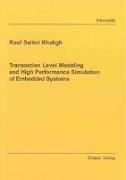- Start
- Transaction Level Modeling and High Performance Simulation of Embedded Systems
Transaction Level Modeling and High Performance Simulation of Embedded Systems
Angebote / Angebote:
Transaction level modeling (TLM) is a simulation centric, system level modeling paradigm for the design of complex embedded systems incorporating both hardware and software. Compared to register transfer level (RTL) and signal level models, transaction level models require far less modeling effort and their simulation is orders of magnitude faster. Various TLM abstraction levels and modeling styles enable trade off between the simulation speed and accuracy for different stages of the system design flow. These have made TLM an increasingly valuable tool in the design of embedded systems, and an active research area in the recent years.
TLM has evolved without an abstract formal foundation, around languages such as SystemC, which have inherited most of their modeling constructs from lower abstraction levels such as the gate level and the RTL. The main focus of TLM has been on constructs for abstract modeling of communication, and the description of behavior has relied on existing, low level modeling constructs. Moreover, although the trend is changing, current TLM languages are bound to sequential simulation schemes. These simulation schemes neither take advantage of the increasingly available low cost parallel processing power, nor from the properties of TLM models. Additionally, the TLM community has acknowledged the need for models with dynamic accuracy, yet no constructs for systematic development of such models have been proposed.
As its foundation, this dissertation proposes a metamodel with a set of high level modeling constructs for abstract representation and study of transaction level models and their simulation semantics. Three modeling styles are represented in terms of the proposed metamodel: the recently proposed loosely timed (LT) and approximately timed (AT) styles, and a novel accuracy adaptive (AA) modeling style for systematic construction of models with dynamic accuracy. Being implementation independent, and detached from any particular simulation algorithm, the metamodel allows different simulation schemes to be devised, used and compared. After a systematic study of existing sequential simulation schemes, it is shown how parallel discrete event simulation (PDES) can be applied to transaction level models. It is then shown that PDES can not always take advantage of the inherent parallelism in models. For such cases, simulation schemes are proposed which exploit the properties of the presented TLM modeling constructs to improve the performance of PDES. A proof of concept modeling and simulation library was implemented to evaluate the presented simulation schemes and modeling styles, using both application independent and application oriented models. At the modeling level, the experiments have confirmed the expressiveness of the proposed modeling constructs for the use cases presented in this dissertation. Additionally, they have shown both the advantages and limitations of sequential simulation techniques such as temporal decoupling. Finally, the results have confirmed that it is possible to significantly improve the simulation performance by taking advantage of the properties of transaction levels models. These would not have been possible without an abstract, implementation independent representation of transaction level models and high level modeling constructs, confirming the advantages of the proposed metamodel.
Libri-Titel folgt in ca. 2 Arbeitstagen

